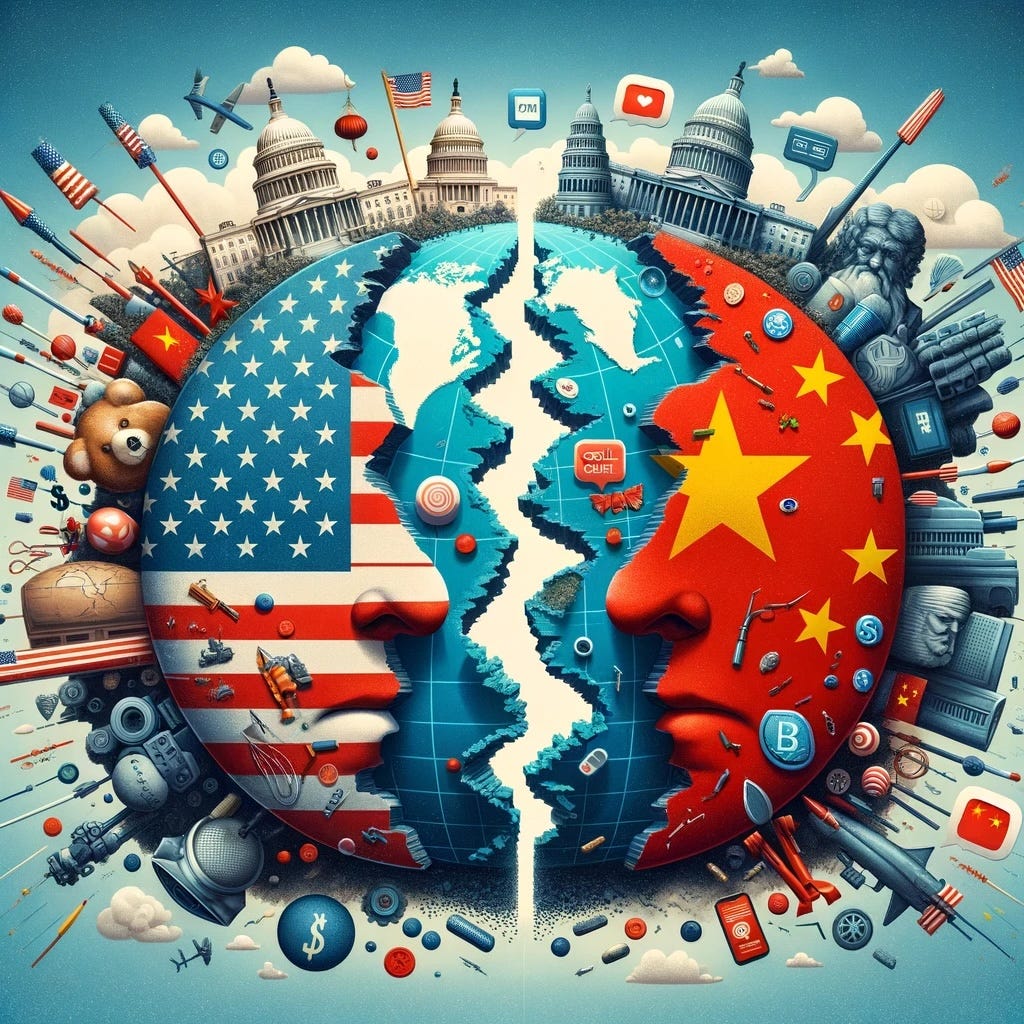By Cobus van Staden, China-Global South Project
In so many ways, 2024 feels like an inflection point — one of those years that carries within it a future yet unformed.
The U.S. election is of course the most prominent of these trends. If Donald Trump becomes the Republican nominee, as expected, it will kick off a series of domino effects that could reshape the United States’ relationship with itself, and with it, the whole world.
The FT columnist Edward Luce argued this week that the U.S. is stuck in a “cold civil war” — one in which the combination of social media and political entrepreneurialism has resulted in two distinct Americas, each armed with a reality-defining media machine.
The problem for the rest of the world is both that this is happening against the background of China’s rise as a global power, and that U.S.-China competition doesn’t neatly break down along partisan lines. If one party favored competitive isolationism and the other de-escalation, that would have clarified things. But, even as I write this, I’m reminded of the writer Jia Tolentino’s line that a defining characteristic of our era is that nothing de-escalates anymore.
Instead, the need to take on China seems to be the one thing Western stakeholders can agree on, before swiftly becoming just another front in the cold civil war. The result has been the collapse of several decades of U.S. free market evangelism, and with it the West’s self-conception as a champion of globalization.
Western calls for protective tariffs against Chinese-made electric vehicles, while couched in the free market talk of countering state subsidies, is a potent sign of how Donald Trump has transformed political and economic orthodoxies. Two of the most likely outcomes in November — a narrow win for either Trump or Biden leading to a social media-amplified backlash from the other side — will only intensify this global fragmentation.
The rest of the world (and particularly the Global South) faces a dual problem: China is increasingly these countries’ main trading partner, and their only affordable source of green energy, data networks, and consumer goods.
In the face of an isolationist U.S. and Europe, keeping China sweet is many Global South governments’ top foreign policy objective. This is because working with China is frequently these countries’ only practical path to any kind of broad-based modernization — a point China is actively pounding in Global South forums.
However, these Global South countries also face the reality that what we have come to think of as the rules-based order of capitalism — a gravity-like impersonal system of immutable financial laws that undergird our reality — was fundamentally built around the global centrality of the U.S. economy, its deep financial reserves, and its powerful dollar.
The abstruse fights around IMF quota enlargement, debt treatments, and dedollarization taking place in the G20, Davos, and BRICS trenches are all different fronts of this larger dispute — how to reflect the reality of China’s growing economic centrality in the Global South in the wider context of a financial architecture build around a United States that is implacably opposed to China’s centrality but that also faces domestic barriers to its familiar role of Globalizer-in-Chief.
These contradictions are increasingly squeezing the Global South. Malaysia’s Prime Minister Anwar Ibrahim recently complained: “Why must I be tied to one interest? I don’t buy into this strong prejudice against China, this China-phobia,” even as he called U.S. charges that he is close to China, “not right and grossly unfair.”
All these upheavals come against two contradictory, but entangled, realities: China is now exporting more to Belt and Road countries than to the U.S., EU and Japan combined. However, this trade is not enough to shield China from Global North trade cuts. At present, the Global South is still too poor to replace the Global North in China’s trade balance.
How these trends play out will shape the 21st century. But first we need to make it through 2024.
This article is free for Sinica subscribers. For daily coverage of every aspect of China’s engagement with the Global South, subscribe to the China-Global South Project (CGSP).
Image: OpenAI. (2024). ChatGPT [Large language model]. /g/g-pmuQfob8d-image-generator




...deep financial reserves, and powerful dollar, isn't it a bluff, just built on paper and on being too big to fail (just for the time being)? ETF aren't real economy nor are bitcoins.